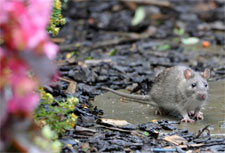Expanded Scope of 'Judicial Deference' - Authority to Impose Short-term Renter Fees
New Case Law

In the landmark case of Lamden v. La Jolla Shores Clubdominium Homeowners Assn. (1999) 21 Cal.4th 249 ("Lamden"), the California Supreme Court established what is known as the "Rule of Judicial Deference" or "Lamden Rule" that, in sum, requires courts to defer to decisions made by a HOA's Board of Directors regarding "ordinary maintenance."
However, in a recently published opinion, the Court of Appeals expanded the scope of the Lamden Rule to include additional decisions made by a HOA's Board, such as those to adopt rules and impose fees on members relating to short-term renters...
Click here to continue reading our blog post entitled:
"Expanded Scope of 'Judicial Deference' - Authority to Impose Short-term Renter Fees"
|
Hardwood Flooring & 'Nuisance' Noise
New Case Law

Homeowners within condominium developments are typically granted broad authority in making improvements to the interior of their respective Units that do not require modification of association common area. However, because of the way in which condominium projects are built, certain improvements made within a Unit may ultimately impact the quiet use and enjoyment of neighboring homeowners (i.e., sound transmissions from hardwood or hard surface flooring). As indicated by the recent case of Ryland Mews Homeowners Association v. Munoz (2015) 2015 Cal.App.LEXIS 161 ("Ryland"), to the extent that a homeowner's interior improvements result in a nuisance to neighboring homeowners, an association does have the authority to compel the homeowner to modify or remove the improvements as necessary to abate the nuisance...
Click here to continue reading our blog post entitled:
"Hardwood Flooring & 'Nuisance' Noise"
|
CA Supreme Court Expands Scope of Attorney's Fees Awards Under Civ. Code Section 5975(c)
New Case Law

Litigation can be a time consuming and costly endeavor. These two factors typically weigh heavily against filing a lawsuit, especially where there is no ability for the party prevailing in the lawsuit to recover its attorney's fees and costs. By default, the "American Rule" with respect to attorney's fees awards states that each party must pay for its own attorney's fees and costs unless otherwise provided by statute or contract. (Code Civ. Pro. § 1021.) Fortunately, in the context of homeowners associations ("HOAs"), Civil Code Section 5975(c) allows for a prevailing party in an action to enforce HOA governing documents to recover its reasonable attorney's fees and costs. Section 5975 is a component of the Davis-Stirling Common Interest Development Act ("Act")--the principal body of Civil Code sections governing California HOAs and common interest developments ("CIDs").
In the recent case of Tract 19051 Homeowners Association v. Kemp (2015) 2015 Cal.LEXIS 1216 ("Kemp"), the California Supreme Court addressed the question of whether Section 5975(c) allows for a prevailing party to recover its attorney's fees and costs in a lawsuit brought under the Act even where the HOA in the lawsuit is not a CID and thus technically not subject to the Act...
Click here to continue reading our blog post entitled:
"CA Supreme Court Expands Scope of Attorney's Fees Awards Under Civ. Code Section 5975(c)"
|
Expanded Emergency Regulation: Prohibited Irrigation Activities
New Regulations

The prolonged period of drought in California has resulted in numerous regulatory and legislative changes aimed at addressing the water shortage (i.e., legislation regarding low-water using plants and watering during droughts). On March 17, 2015, the State Water Resources Control Board adopted an expanded emergency regulation to safeguard California's remaining water supplies. Under the expanded emergency regulation, additional prohibitions on potable water use have gone into immediate effect. All Californians are now prohibited from using potable water to:
- Wash down sidewalks and driveways;
- Water outdoor landscapes in a manner that causes excessive runoff;
- Washing a motor vehicle with a hose, unless the hose is fitted with a shut-off nozzle;
- Operating a fountain or decorative water feature, unless the water is part of a recirculating system; and
- Irrigating turf or ornamental landscapes during and 48 hrs following measurable precipitation (*New)
The newly adopted prohibition on irrigating turf/landscapes during and 48 hours following precipitation (rain) may impact the common area maintenance/irrigation practices of HOAs. Failure to comply with that provision could subject a HOA to a fine of $500 per day.
To read more about the emergency regulation, click here.
|
Asked & Answered: Personal Food Gardens Becoming a Nuisance?

Asked - "Fallen and decayed vegetables from a homeowner's garden are attracting numerous rats and other pests. With the new law permitting personal food gardens, is there anything our HOA can do to address this issue?"
Answered - Probably. AB 2561, effective January 1, 2015, added Section 1940.10 and 4750 to the Civil Code. In sum, Section 4750 grants homeowners within HOAs the right to use their backyards for "personal agriculture," regardless of any provisions contained in a HOA's governing documents to the contrary. However, that right is not absolute. HOAs still have some authority to restrict and regulate personal food gardens in the following respects...
Click here to continue reading our blog post entited:
"Personal Food Gardens Becoming a Nuisance?"
|
|
Welcome New TLG Clients!
|
Dana Point
Aliso Viejo
San Diego
Irvine
Palm Desert
|
|